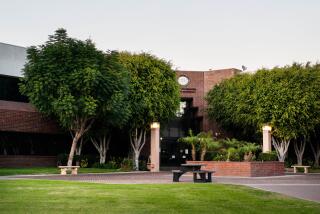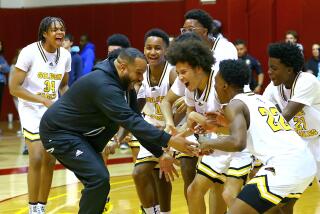A Case for Radical Surgery
- Share via
The Martin Luther King Jr./Drew Medical Center is facing a crisis. Again. This time the problem is not, as it has been in the past, botched care -- the woman who contracted AIDS after receiving a transfusion of HIV-positive blood, the patient who died of a gunshot wound to his knee after the trauma staff spent six hours trying to find a vascular surgeon -- but botched training that could lead to more botched care.
A national accrediting panel has stripped the Willowbrook teaching hospital of its right to train surgeons after its (now former) surgery chairman, despite repeated warnings, admitted more medical residents than guidelines allowed. The program already was on probation for, among other reasons, not giving residents enough hands-on surgical experience, a problem that having too many residents compounded.
Surgery is not the only program in trouble. Regulators earlier revoked accreditation for diagnostic radiology and put four other programs on probation or under warnings. The accrediting council begins an overall review next week that could, if unfavorable, shut down the entire training program, whose doctors-in-training serve one of the most densely populated regions of Los Angeles County. The hospital itself is at risk.
It is precisely because this hospital is so needed that county supervisors must not settle for the same old promises to fix the status quo. To really fix it they will have to put patient welfare ahead of politics, even if King/Drew’s history makes that difficult.
The county-owned Martin Luther King Jr. Hospital was founded in the wake of the 1965 Watts riots, as was the private Charles R. Drew University of Medicine and Science. The university serves as the research arm of King and, under contract with the county, oversees the doctor training program, just as USC and UCLA serve the two other major county-owned acute-care hospitals. The King/Drew Medical Center set out to attract and train minority medical professionals to serve South L.A., Watts, Compton and other then mostly black communities. King/Drew became a source of pride -- and a source of jobs for neighborhoods short of them.
Latinos now outnumber African Americans in the area. Competition over jobs as well as political “ownership” of King-Drew has long interfered with honest civic discussion about the quality of patient care at a hospital that its community routinely calls “Killer King” and “Martin Luther Kill.”
Part of the problem behind King/Drew’s crisis-to-crisis operation traces to the challenge of creating a medical school from scratch, one that lacks the prestige and deep pockets of an established university.
The county has to consider fundamental change, whether asking the longer-established UCLA or USC to take Drew on as a division or coming up with a single countywide doctor training program. What matters to the people who depend on King/Drew for care is not preserving the medical center’s past but ensuring that it has a future.






